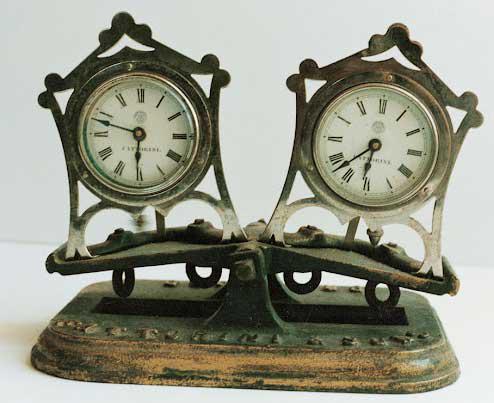
You come late for your G/90,d5 contest. After finding your assigned playing spot you notice that there is no equipment and no opponent anywhere in sight. You set up your equipment—yes, equipment must be set up before the game clock can be started. By the time you get your equipment set up twenty minutes have passed since the start of the round. From your timer and your opponent’s timer, you need to subtract ten minutes (half of the twenty minutes since the start of the round) so that each of you has eighty minutes left to complete your game. Now
start your opponent’s clock and let it tick off minutes until they arrive. If you are unsuccessful in following this procedure, then your game may end up going longer than expected. That can cause the next round to start late for all the other players. TDs can help you set your clock using this procedure.
Tick tock, tick tock: Come late to a game and lose time on the clock.
If you come late to your game and your opponent has no equipment set up yet, then you both equally split the amount of time you were tardy to the game. Without equipment it does not matter if one or both players are present—you need at least a set and board to start the contest.
Did you know that you can let your opponent eat their tardy time and not make a time forfeit claim as long as their clock is running? How does that work? There is a time limit for your no-show opponent to appear (ask the TD). When that time is up you can claim a time forfeit win, or not. You can let your opponent’s clock continue to count down the minutes past the forfeit time with the hope that they will show up before their flag falls. If they do materialize, you can offer to let them play the game with whatever time they have left on their clock; i.e., theoretically the clock odds are in your favor. In practice those clock time odds may not work out as well as one would expect—you can still lose the game.
And remember, if your opponent is tardy (no matter which color they are playing) they also forfeit their right to use their equipment—unless the equipment you set up is substandard (as judged by the TD).
In a G/60, d5 time control the TD tells the players to start their clocks. You have no opponent, but as a good sport, you feel you should wait for them to arrive before starting their timer. They arrive 20 minutes late. The game clock finally gets started. The contest is an interesting back-and-forth game that uses up almost all of the time on both clocks. Your game finishes well after what was supposed to be the start of the next round. Your good sportsmanship gesture—of waiting to start the game clock until your opponent arrived—has now inconvenienced all of the other participants in the tournament; i.e., at the very least the next round is probably going to start late.
If your opponent is there or is not, start your clock on the spot.
Properly start the clock when the TD begins the round,
even if your opponent is not there. Many tournaments schedule the rounds to start at specified times, and that timetable is very often not flexible. And remember that if you are the general of white pieces then start your clock, make your move, and then start your opponent’s timer. The leader of the black pieces can simply start white’s timer.
Have no timer for your game? It’ll work out; you’ll get one later, there is no doubt.
In a G/30, d5 contest, you were unable to secure a clock, so you started to play without one. After you and your opponent have led your chess forces around the board for a total game time of 50 minutes, the TD places a properly set clock at your board. You and your opponent each get five minutes to finish the game (base time control of thirty minutes each totals sixty minutes of game time). The TD is splitting the remaining 10 minutes of total game time between you and your opponent equally. You protest that your adversary took a lot longer to move than you did, so you should have more time on your clock than he does. Sorry, without a clock on the game from the start, you have no proof of how much time either you or your rival took to push wood. You now each have five minutes to complete your struggle.
Occasionally neither you nor your opponent have a clock to use in your game—even after trying to borrow one. Tell the TD. If they don’t have an extra clock to loan out, then start playing. If a chess clock becomes available later, it should be set so that both you and your opponent split equally the time that is left in the game. You may need the TD’s help in doing this.
Next month those scribbles that we call notation will come under the “Just the Rules” microscope.
 Tim Just is a National Tournament Director, FIDE National Arbiter, and editor of the 5th & 6th edition of the US Chess Rulebook. He is also the author of My Opponent is Eating a Doughnut & Just Law, which are both available from US Chess Sales and Amazon/Kindle. Additionally, Tim recently revised The Guide To Scholastic Chess, a guide created to help teachers and scholastic organizers who wish to begin, improve, or strengthen their school chess program. Tim is also a member of the US Chess Rules Committee and his new column exclusive to US Chess, “Just the Rules” will help clarify potentially confusing regulations.
Tim Just is a National Tournament Director, FIDE National Arbiter, and editor of the 5th & 6th edition of the US Chess Rulebook. He is also the author of My Opponent is Eating a Doughnut & Just Law, which are both available from US Chess Sales and Amazon/Kindle. Additionally, Tim recently revised The Guide To Scholastic Chess, a guide created to help teachers and scholastic organizers who wish to begin, improve, or strengthen their school chess program. Tim is also a member of the US Chess Rules Committee and his new column exclusive to US Chess, “Just the Rules” will help clarify potentially confusing regulations. You come late for your G/90,d5 contest. After finding your assigned playing spot you notice that there is no equipment and no opponent anywhere in sight. You set up your equipment—yes, equipment must be set up before the game clock can be started. By the time you get your equipment set up twenty minutes have passed since the start of the round. From your timer and your opponent’s timer, you need to subtract ten minutes (half of the twenty minutes since the start of the round) so that each of you has eighty minutes left to complete your game. Now start your opponent’s clock and let it tick off minutes until they arrive. If you are unsuccessful in following this procedure, then your game may end up going longer than expected. That can cause the next round to start late for all the other players. TDs can help you set your clock using this procedure.
You come late for your G/90,d5 contest. After finding your assigned playing spot you notice that there is no equipment and no opponent anywhere in sight. You set up your equipment—yes, equipment must be set up before the game clock can be started. By the time you get your equipment set up twenty minutes have passed since the start of the round. From your timer and your opponent’s timer, you need to subtract ten minutes (half of the twenty minutes since the start of the round) so that each of you has eighty minutes left to complete your game. Now start your opponent’s clock and let it tick off minutes until they arrive. If you are unsuccessful in following this procedure, then your game may end up going longer than expected. That can cause the next round to start late for all the other players. TDs can help you set your clock using this procedure.
 Tim Just is a National Tournament Director, FIDE National Arbiter, and editor of the 5th & 6th edition of the US Chess Rulebook. He is also the author of My Opponent is Eating a Doughnut & Just Law, which are both available from US Chess Sales and Amazon/Kindle. Additionally, Tim recently revised The Guide To Scholastic Chess, a guide created to help teachers and scholastic organizers who wish to begin, improve, or strengthen their school chess program. Tim is also a member of the US Chess Rules Committee and his new column exclusive to US Chess, “Just the Rules” will help clarify potentially confusing regulations.
Tim Just is a National Tournament Director, FIDE National Arbiter, and editor of the 5th & 6th edition of the US Chess Rulebook. He is also the author of My Opponent is Eating a Doughnut & Just Law, which are both available from US Chess Sales and Amazon/Kindle. Additionally, Tim recently revised The Guide To Scholastic Chess, a guide created to help teachers and scholastic organizers who wish to begin, improve, or strengthen their school chess program. Tim is also a member of the US Chess Rules Committee and his new column exclusive to US Chess, “Just the Rules” will help clarify potentially confusing regulations.






